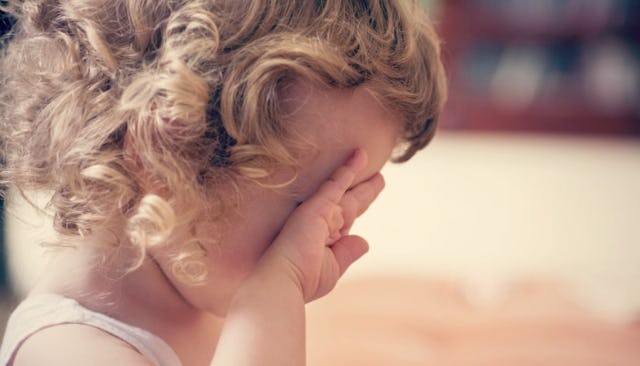Why I Won't Call My Toddler 'Bad'

I don’t understand what makes babies and toddlers “good” in the eyes of most people.
My daughter was a good baby, according to most people. She didn’t fuss much at night, never had colic, smiled early, and was happy to sit by herself, and let nearly everyone hold her. In short: She wasn’t miserable, so she didn’t make everyone around her miserable. I’m glad. But as far as I’m concerned, the term “easy” is far more appropriate than “good.”
But now that she’s entering the adventuresome toddler stage, she’s picking up a handful of “bad” habits.
Or are they bad?
The culture I’m surrounded by tells me that toddler temper tantrums in the middle of Walmart are “bad.” Either the child or parent must have failed at some point for such a scream-fest to occur. But a quick review of my Facebook feed (especially during election season) reveals that we adults still throw tantrums. Sure, our rage-posting may seem more logical and relatable—but is it?
Kids scream because they aren’t brought to the park. Adults complain and stew when they’ve been called in to work on their day off. Is there really a difference?
Picky eaters are supposedly “bad.” Sure, we adults tend to enjoy more foods than toddlers do, but we still turn up our noses at many dishes enjoyed by different cultures.
We adults hate being put on hold. We don’t like to talk to customer representatives who don’t speak our language well. In a similar way, toddlers don’t like to be told to wait. They don’t like it when people ignore their lengthy stream-of-consciousness stories.
The difference? Not much—we just know how to handle our frustrations with fewer tears (most of the time, that is).
I’ve witnessed toddlers who were reprimanded for not hugging someone or refusing to look an adult in the eye. Seriously, folks? Every time we adults interact with someone, we make instant decisions about whether this person is safe, is nice, is friendly. From there, we’re expected to know whether we should avoid or befriend them. Kids analyze people too. We may not understand why they choose to spurn others, but assuming that they’re just being rude isn’t OK.
Now, don’t misunderstand what I’m saying.
Tantrums, pickiness, anger—these aren’t good things. But they’re human things.
Toddlers are more obnoxious when it comes to telling us their dislikes and opinions, sure. But this isn’t because they’re bad. This is because they don’t have the social skills or understanding that we have. They don’t understand that their wishes can result in loads of work for their sleep-deprived parents. It’s difficult for them to comprehend how hurtful a “you’re fat” comment can be to someone who’s trying to lose weight.
Toddlers are little people trying to learn how to navigate the world. Everything is foreign to them. Their ability to verbalize is rudimentary, at best. When strong emotions are present, it’s likely that they won’t know how to communicate in any way other than wailing.
So yes, I’ll do my best to avert tantrums before they happen and to end them as quickly as possible. But I won’t punish my daughter for having emotions and desires—I’ll remind her that other people also have feelings and wants.
When she refuses to hug someone, I’m not going to reprimand her. It’s her body. If she doesn’t want physical contact with someone, that’s her choice.
If she’s unwilling to eat salad, that’s OK. I can’t stand licorice. Being forced to eat it certainly wouldn’t change my opinion, and I don’t expect it to change hers, either.
Yes, raising a toddler is going to take a stupid amount of effort. No, I’m not always going to get it right. But this isn’t a stage where children are bad. This is a stage where children are learning about social skills, language, foods, tools, consent, and emotions at an astronomically fast rate.
They may frustrate you and me. They may exhaust us. They may bring us to our wit’s end and back again. But they aren’t being malicious. They’re just figuring life out. And someday, we’ll (probably) look back and miss this crazy, wonderful, exhausting stage of life.
This article was originally published on